- Home
- Diana Wynne Jones
The Magicians of Caprona Page 5
The Magicians of Caprona Read online
Page 5
“Merrily his music ringing,
See an Angel cometh singing,
Words of peace and comfort bringing
To Caprona’s city fair.
“Victory that faileth never,
Friendship that no strife can sever,
Lasting strength and peace for ever,
For Caprona’s city fair.
“See the Devil flee astounded!
In Caprona now is founded
Virtue strong and peace unbounded—
In Caprona’s city fair.”
Every one of them was wondering what the real words were.
They came home for the family celebrations, and there was still no word from the Duke. Then Christmas was over. New Year drew on and passed too, and the boys were forced to realize that there would be no invitation after all. Each told himself he had known the Duke was like that. They did not speak of it to one another. But they were both bitterly disappointed.
They were roused from their gloom by Lucia racing along the gallery, screaming, “Come and look at Rosa’s young man!”
“What?” said Antonio, raising his worried face from a book about the Angel of Caprona. “What? Nothing’s decided yet.”
Lucia leaped from foot to foot. She was pink with excitement. “Rosa’s decided for herself! I knew she would. Come and see!”
Led by Lucia, Antonio, Paolo, Tonino and Benvenuto raced along the gallery and down the stone stairs at the end. People and cats were streaming through the courtyard from all directions, hurrying to the room called the Saloon, beyond the dining room.
Rosa was standing near the windows, looking happy but defiant, with both hands clasped around the arm of an embarrassed-looking young man with ginger hair. A bright ring winked on Rosa’s finger. Elizabeth was with them, looking as happy as Rosa and almost as defiant. When the young man saw the family streaming through the door and crowding towards him, his face became bright pink and his hand went up to loosen his smart tie. But, in spite of that, it was plain to everyone that, underneath, the young man was as happy as Rosa. And Rosa was so happy that she seemed to shine, like the Angel over the gate. This made everyone stare, marveling. Which, of course, made the young man more embarrassed than ever.
Old Niccolo cleared his throat. “Now look here,” he said. Then he stopped. This was Antonio’s business. He looked at Antonio.
Paolo and Tonino noticed that their father looked at their mother first. Elizabeth’s happy look seemed to reassure him a little. “Now, just who are you?” he said to the young man. “How did you meet my Rosa?”
“He was one of the contractors on the Old Bridge, Father,” said Rosa.
“And he has enormous natural talent, Antonio,” said Elizabeth, “and a beautiful singing voice.”
“All right, all right,” said Antonio. “Let the boy speak for himself, women.”
The young man swallowed, and helped the swallow down with a shake of his tie. His face was now very pale. “My name is Marco Andretti,” he said in a pleasant, if husky, voice. “I—I think you met my brother at the bridge, sir. I was on the other shift. That’s how I came to meet Rosa.” The way he smiled down at Rosa left everybody hoping that he would be fit to become a Montana.
“It’ll break their hearts if Father says no,” Lucia whispered to Paolo. Paolo nodded. He could see that.
Antonio was pulling his lip, which was a thing he did when his face could hold no more worry than it did already. “Yes,” he said. “I’ve met Mario Andretti, of course. A very respectable family.” He made that sound not altogether a good thing. “But I’m sure you’re aware, Signor Andretti, that ours is a special family. We have to be careful who we marry. First, what do you think of the Petrocchis?”
Marco’s pale face went fiery red. He answered with a violence which surprised the Montanas, “I hate their guts, Signor Montana!” He seemed so upset that Rosa pulled his arm down and patted it soothingly.
“Marco has personal family reasons, Father,” she said.
“Which I’d prefer not to go into,” Marco said.
“We—well, I’ll not press you for them,” Antonio said, and continued to pull his lip. “But, you see, our family must marry someone with at least some talent for magic. Have you any ability there, Signor Andretti?”
Marco Andretti seemed to relax at this. He smiled, and gently took Rosa’s hands off his sleeve. Then he sang. Elizabeth had been right about his voice. It was a golden tenor. Uncle Lorenzo was heard to rumble that he could not think what a voice like that was doing outside the Milan Opera.
“A golden tree there grows, a tree
Whose golden branches bud with green. …”
sang Marco. As he sang, the tree came into being, rooted in the carpet between Rosa and Antonio, first as a faint gold shadow, then as a rattling metal shape, dazzling gold in the shafts of sunlight from the windows. The Montanas nodded their appreciation. The trunk and each branch, even the smallest twig, was indeed pure gold. But Marco sang on, and as he sang, the gold twigs put out buds, pale and fist-shaped at first, then bright and pointed. Instants later, the tree was in leaf. It was moving and rattling constantly to Marco’s singing. It put out pink and white flowers in clusters, which budded, expanded and dropped, as quickly as flames in a firework. The room was full of scent, then of petals fluttering like confetti. Marco still sang, and the tree still moved. Before the last petal had fallen, pointed green fruit was swelling where the flowers had been. The fruit grew brownish and swelled, and swelled and turned bulging and yellow, until the tree drooped under the weight of a heavy crop of big yellow pears.
“… With golden fruit for everyone,”
Marco concluded. He put up a hand, picked one of the pears and held it, rather diffidently, out to Antonio.
There were murmurs of appreciation from the rest of the family. Antonio took the pear and sniffed it. And he smiled, to Marco’s evident relief. “Good fruit,” he said. “That was very elegantly done, Signor Andretti. But there is one more thing I must ask you. Would you agree to change your name to Montana? That is our custom, you see.”
“Yes, Rosa told me,” said Marco. “And—and this is a difficulty. My brother needs me in his firm, and he too wants to keep his family name. Would it be all right if I’m known as Montana when I’m here, and as—as Andretti when I’m at home with my brother?”
“You mean you and Rosa wouldn’t live here?” Antonio asked, astonished.
“Not all the time. No,” said Marco. From the way he said it, it was clear he was not going to change his mind.
This was serious. Antonio looked at Old Niccolo. And there were grave faces all round at the thought of the family being broken up.
“I don’t see why they shouldn’t,” said Elizabeth.
“Well—my great-uncle did it,” Old Niccolo said. “But it was not a success. His wife ran off to Sicily with a greasy little warlock.”
“That doesn’t mean I’m going to!” Rosa said.
The family wavered, with the tree gently rattling in their midst. Everyone loved Rosa. Marco was clearly nice. Nobody wanted to break their hearts. But this idea of living away from the Casa—!
Aunt Francesca heaved herself forward, saying, “I side with Elizabeth. Our Rosa has found herself a nice boy with more talent and a better voice than I’ve seen outside our family for years. Let them get married.”
Antonio looked dreadfully worried at this, but he did not pull his lip. He seemed to be relaxing, ready to agree, when Rinaldo set the tree rattling furiously by pushing his way underneath it.
“Just a moment. Aren’t we all being a bit trustful? Who is this fellow, after all? Why haven’t we come across him and his talents before?”
Paolo hung his head and watched Rinaldo under his hair. This was Rinaldo in the mood he least admired. Rinaldo loud and aggressive, with an unpleasant twist to his mouth. Rinaldo was still a little pale from the cut on his head, but this went rather well with the black clothes and the red brigand’s scarf. Rinald
o knew it did. He flung up his head with an air, and contemptuously brushed off a petal that had fallen on his black sleeve. And he looked at Marco, challenging him to answer.
The way Marco looked back showed that he was quite ready to stand up to Rinaldo. “I’ve been at college in Rome until recently,” he said. “If that’s what you mean.”
Rinaldo swung round to face the family. “So he says,” he said. “He’s done a pretty trick for us, and said all the right things—but so would anyone in his place.” He swung round on Marco. It was so dramatic that Tonino winced and even Paolo felt a little unhappy. “I don’t trust you,” said Rinaldo. “I’ve seen your face before somewhere.”
“At the Old Bridge,” said Marco.
“No, not there. It was somewhere else,” said Rinaldo.
And this must be true, Tonino realized. Marco did have a familiar look. And Tonino could not have seen him at the Old Bridge, because Tonino had never been there.
“Do you want me to fetch my brother, or my priest, to vouch for me?” asked Marco.
“No,” said Rinaldo rudely. “I want the truth.”
Marco took a deep breath. “I don’t want to be unfriendly,” he said. The arm Rosa was not holding bent, and so did the fist on the end of it. Rinaldo gave it a look as if he welcomed it, and swaggered a step nearer.
“Please!” Rosa said uselessly.
Benvenuto moved in Tonino’s arms. Into Tonino’s head came a picture of a large stripy tomcat swaggering on the Casa roof—Benvenuto’s roof. Tonino nearly laughed. Benvenuto’s muscular back legs pushed him backwards into Paolo as Benvenuto took off. Benvenuto landed between Rinaldo and Marco. There was a gentle “Ah!” from the rest of the family. They knew Benvenuto would settle it.
Benvenuto deliberately ignored Rinaldo. Arching himself tall, with his tail straight up like a cypress tree, he minced to Marco’s legs and rubbed himself around them. Marco undoubled his fist and bent to hold his hand out to Benvenuto. “Hallo,” he said. “What’s your name?” He paused, for Benvenuto to tell him. “I’m pleased to meet you, Benvenuto,” he said.
The “Ah!” from the family was loud and long this time. It was followed by cries of, “Get out of it, Rinaldo! Don’t make a fool of yourself! Leave Marco alone!”
Though Rinaldo was nothing like as easily crushed as Domenico, even he could not stand up to the whole family. When he looked at Old Niccolo and saw Old Niccolo waving him angrily aside, he gave up and shoved his way out of the room.
“Rosa and Marco,” said Antonio, “I give my provisional consent to your marriage.”
Upon that, everyone hugged everyone else, shook hands with Marco and kissed Rosa. Very flushed and happy, Marco plucked pear after pear from the golden tree and gave them to everyone, even the new est baby. They were delicious pears, ripe to perfection. They melted in mouths and dribbled down chins.
“I don’t want to be a spoilsport,” Aunt Maria said, slurping juice in Paolo’s ear, “but a tree in the Saloon is going to be a nuisance.”
But Marco had thought of that. As soon as the last pear was picked, the tree began to fade. Soon it was a clattering golden glitter, a vanishing shadow-tree, and then it was not there at all. Everyone applauded. Aunt Gina and Aunt Anna fetched bottles of wine and glasses, and the Casa drank to the health of Rosa and Marco.
“Thank goodness!” Tonino heard Elizabeth say. “I was so nervous for her!”
On the other side of Elizabeth, Old Niccolo was telling Uncle Lorenzo that Marco was a real acquisition, because he could understand cats. Tonino felt a little wistful at this. He went outside into the chilly yard. As he had expected, Benvenuto was now curled up in the sunny patch on the gallery steps. He undulated his tail in annoyance at Tonino. He had just settled down for a sleep.
But Marco could not understand cats, Benvenuto said irritably. He knew Benvenuto’s name, because Rosa had told him, but he had no idea what Benvenuto had actually said to him. Benvenuto had told him that he and Rinaldo would get thoroughly scratched if they started a fight in the Casa—neither of them was boss cat here. Now, if Tonino would go away, a cat could get some sleep.
This was a great relief to Tonino. He now felt free to like Marco as much as Paolo did. Marco was fun. He was never in the Casa for very long, because he and his brother were building a villa out beyond the New Bridge, but he was one of the few people Tonino laid down his book to talk to. And that, Lucia told Rosa, was a compliment indeed.
Rosa and Marco were to be married in the spring. They laughed about it constantly as they swept in and out of the Casa together. Antonio and Uncle Lorenzo walked out to the villa where Mario Andretti lived, and arranged it all. Mario Andretti came to the Casa to settle the details. He was a large fat man—who drove a shrewd bargain, Aunt Francesca said—and quite different from Marco. The most notable thing about him was the long white motor car he came in.
Old Niccolo looked at that car reflectively. “It smells,” he said. “But it looks more reliable than a cardboard horse.” He sighed. He still felt deeply humiliated. All the same, after Mario Andretti had driven away, Tonino was very interested to be sent out to the post with two letters. One was addressed to Ferrari, the other to Rolls-Royce in England.
In the normal way, the talk in the Casa would have been all about that car and those two letters. But they passed unnoticed in the anxious murmurs about Florence, Siena and Pisa. The only topic able to drown out the talk of war was Rosa’s wedding dress. Should it be long or short? With a train, or not? And what kind of veil? Rosa was quite as independent about that as she had been over Marco.
“I suppose I have no say in it at all,” she said. “I shall have it knee-length one side and a train ten feet long on the other, I think. And no veil. Just a black mask.”
This thoroughly offended Aunt Maria and Aunt Gina, who were the chief arguers. What with the noise they made, and the twanging the other side of the room, where Antonio had roped Marco in to help find the words to the Angel, Tonino was unable to concentrate on his book. He took it along the gallery to the library, hoping for peace there.
But Rinaldo was leaning on the gallery rail outside the library, looking remarkably sinister, and he stopped Tonino. “That Marco,” he said. “I wish I could remember where I saw him. I’ve seen him in the Art Gallery with Rosa, but it wasn’t there. I know it was somewhere much more damaging than that.”
Tonino had no doubt that Rinaldo knew all sorts of damaging places. He took his book into the library, hoping that Rinaldo would not remember the place, and settled down in the chilly mustiness to read.
The next moment, Benvenuto landed on his book with a thump.
“Oh get off!” said Tonino. “I start school tomorrow, and I want to finish this first.”
No, said Benvenuto. Tonino was to go to Old Niccolo at once. A flurry of scrips, spells, yellow parchment rolls and then a row of huge red books passed behind Tonino’s eyes. It was followed by a storm of enormous images. Giants were running, banging, smoking and burning, and they all wore red and gold. But not yet. They were preparing to fight, marching in great huge boots. Benvenuto was so urgent that it took all Tonino’s skill to sort out what he meant.
“All right,” said Tonino. “I’ll tell him.” He got up and pelted round the gallery, past Rinaldo, who said, “What’s the hurry?” to Old Niccolo’s quarters. Old Niccolo was just coming out.
“Please,” said Tonino, “Benvenuto says to get out the war-spells. The Duke is calling up the Reserves.”
Old Niccolo stood so very quiet and wide-eyed that Tonino thought he did not believe it. Old Niccolo was feeling for the door-frame. He seemed to think it was missing.
“You did hear me, did you?” Tonino asked.
“Yes,” said Old Niccolo. “Yes, I heard. It’s just so soon—so sudden. I wish the Duke had warned us. So war is coming. Pray God our strength is still enough.”
Chapter 5
Benvenuto’s news caused a stampede in the Casa Montana. The older cousins raced
to the Scriptorium and began packing away all the usual spells, inks and pens. The aunts fetched out the special inks for use in war-spells. The uncles staggered under reams of fresh paper and parchment. Antonio, Old Niccolo and Rinaldo went to the library and fetched the giant red volumes, with WAR stamped on their spines, while Elizabeth raced to the music room with all the children to put away the ordinary music and set out the tunes and instruments of war.
Meanwhile, Rosa, Marco and Domenico raced out into the Via Magica and came back with newspapers. Everyone at once left what they were doing and crowded into the dining room to see what the papers said.
They made a pile of people, all craning over the table. Rinaldo was standing on a chair, leaning over three aunts. Marco was underneath, craning anxiously sideways, head to head with Old Niccolo, as Rosa flipped over the pages. There were so many other people packed in and leaning over that Lucia, Paolo and Tonino were forced to squat with their chins on the table, in order to see at all.
“No, nothing,” Rosa said, flipping over the second paper.
“Wait,” said Marco. “Look at the Stop Press.”
Everyone swayed towards it, pushing Marco further sideways. Then Tonino almost knew where he had seen Marco before.
“There it is,” said Antonio.
All the bodies came upright, with their faces very serious.
“Reserve mobilized, right enough,” said Rosa. “Oh, Marco!”
“What’s the matter?” Rinaldo asked jeeringly from his chair. “Is Marco a Reservist?”

 Fire and Hemlock
Fire and Hemlock Reflections: On the Magic of Writing
Reflections: On the Magic of Writing The Game
The Game The Crown of Dalemark
The Crown of Dalemark Deep Secret
Deep Secret Witch Week
Witch Week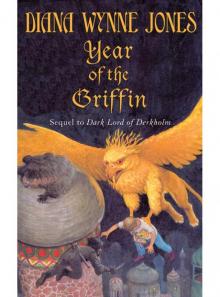 Year of the Griffin
Year of the Griffin Wild Robert
Wild Robert Earwig and the Witch
Earwig and the Witch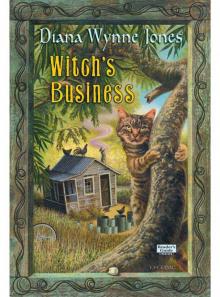 Witch's Business
Witch's Business Dogsbody
Dogsbody Caribbean Cruising
Caribbean Cruising Cart and Cwidder
Cart and Cwidder Conrad's Fate
Conrad's Fate Howl's Moving Castle
Howl's Moving Castle The Spellcoats
The Spellcoats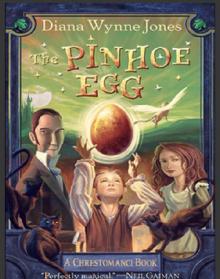 The Pinhoe Egg
The Pinhoe Egg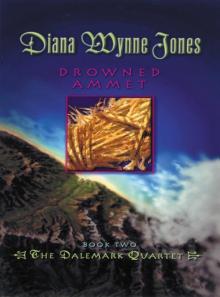 Drowned Ammet
Drowned Ammet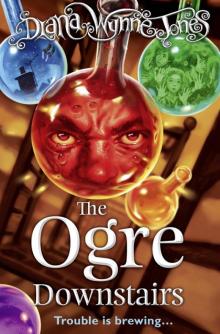 The Ogre Downstairs
The Ogre Downstairs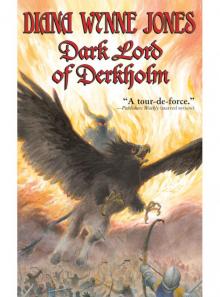 Dark Lord of Derkholm
Dark Lord of Derkholm Castle in the Air
Castle in the Air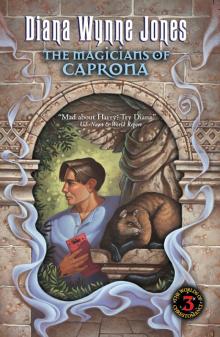 The Magicians of Caprona
The Magicians of Caprona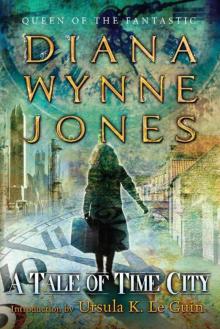 A Tale of Time City
A Tale of Time City The Lives of Christopher Chant
The Lives of Christopher Chant The Magicians of Caprona (UK)
The Magicians of Caprona (UK)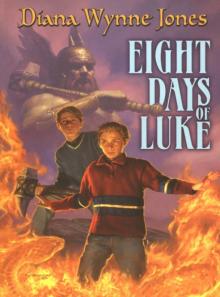 Eight Days of Luke
Eight Days of Luke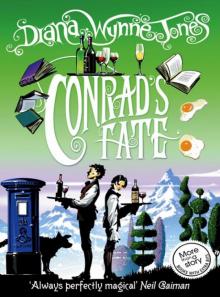 Conrad's Fate (UK)
Conrad's Fate (UK) A Sudden Wild Magic
A Sudden Wild Magic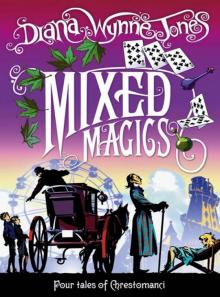 Mixed Magics (UK)
Mixed Magics (UK)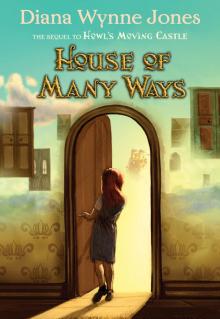 House of Many Ways
House of Many Ways Witch Week (UK)
Witch Week (UK) The Homeward Bounders
The Homeward Bounders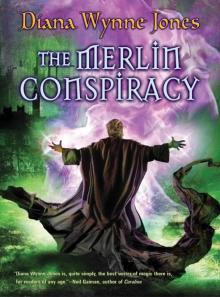 The Merlin Conspiracy
The Merlin Conspiracy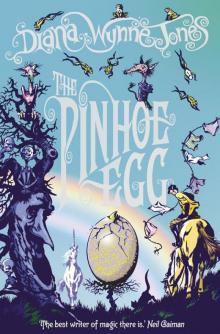 The Pinhoe Egg (UK)
The Pinhoe Egg (UK)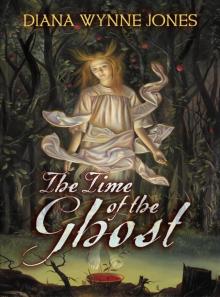 The Time of the Ghost
The Time of the Ghost Hexwood
Hexwood Enchanted Glass
Enchanted Glass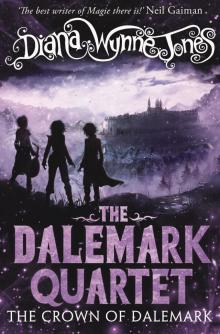 The Crown of Dalemark (UK)
The Crown of Dalemark (UK)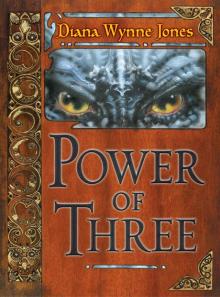 Power of Three
Power of Three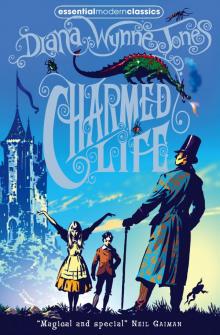 Charmed Life (UK)
Charmed Life (UK)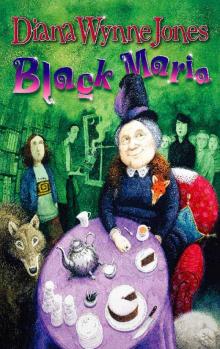 Black Maria
Black Maria The Islands of Chaldea
The Islands of Chaldea Cart and Cwidder (UK)
Cart and Cwidder (UK) Drowned Ammet (UK)
Drowned Ammet (UK) Charmed Life
Charmed Life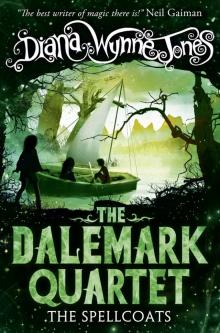 The Spellcoats (UK)
The Spellcoats (UK)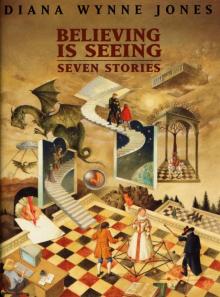 Believing Is Seeing
Believing Is Seeing Samantha's Diary
Samantha's Diary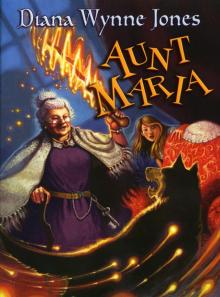 Aunt Maria
Aunt Maria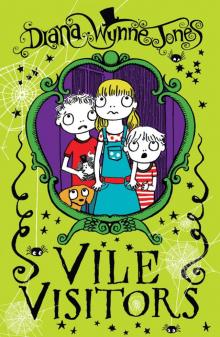 Vile Visitors
Vile Visitors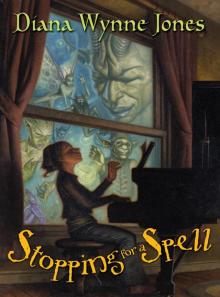 Stopping for a Spell
Stopping for a Spell Freaky Families
Freaky Families Unexpected Magic
Unexpected Magic Reflections
Reflections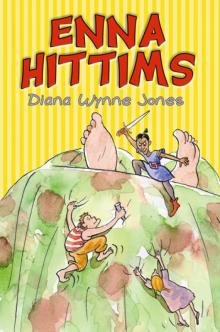 Enna Hittms
Enna Hittms Mixed Magics: Four Tales of Chrestomanci
Mixed Magics: Four Tales of Chrestomanci